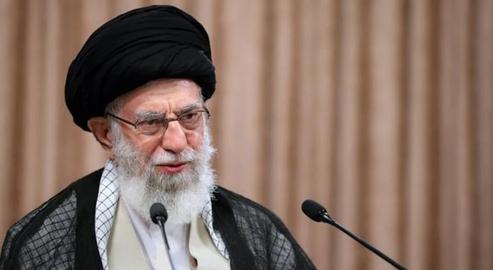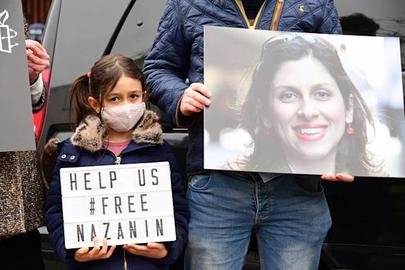Within minutes of being rebuked by Supreme Leader Ali Khamenei over the contents of an interview leaked last weekend, Foreign Minister Mohammad Javad Zarif humbly apologized for his controversial remarks.
In an Instagram post, he expressed particular regret for his seemingly disparaging comments about General Ghasem Soleimani, the former commander of the Revolutionary Guards’ Quds Force who was killed by an American drone in January 2020. He also apologized for having “upset” the Supreme Leader.
“I am very sorry,” he wrote, “that some of my personal viewpoints, which were expressed only to convey my honest experiences and were not meant for publication in any way, have been published underhandedly and have been exploited by those hostile to the country, the people and the revolution. If I had known a sentence of it would be made public, I certainly would not have mentioned it."
“I hope that the good people of Iran, all the devotees of General [Soleimani] and especially the great family of Soleimani will forgive me.”
In his televised speech on Sunday, May 2, without naming Zarif, Khamenei had said that he was “surprised and saddened” to hear the Foreign Minister’s comments on Soleimani. “Some of these comments are repetition of the hostile talk of our enemies,” he said, “repetition of the words of America... We shouldn’t say things that convey the sense that we are repeating what they are saying, whether on the Quds Force or on Martyr Soleimani.”
What Did the Supreme Leader’s Speech Reveal?
The Supreme Leader’s intervention, siding with what Zarif had termed the “battlefield” – i.e. the Revolutionary Guards and the Quds Force – over diplomacy, came as little surprise.
This has always been a red line for Khamenei because the Quds Force grew into what it is today under his patronage, and his overriding concern has always been to maintain his own support base. Nonetheless, some government officials might have been expecting that he would treat Zarif more kindly.
The speech on Sunday, May 2, was similar to another speech Khamenei delivered on June 19, 2009, a week after Iran’s disputed presidential election. In that address, he said Mahmoud Ahmadinejad was closer to him than any other member of the government. Many remembered this statement of his and in the years that followed, repeatedly reminded Khamenei’s supporters of this improper intrusion into politics.
In his Sunday speech, Khamenei affirmed again that he plays a decisive role in the Islamic Republic’s foreign policy. He has repeatedly called the 2015 nuclear agreement a “total loss” and publicly claimed he was not involved in the details of the negotiations. But this time, he clearly stated that the Foreign Ministry only “executes” Iran’s foreign policy and, to justify this claim, he asserted that this arrangement is the same all around the world.
“Throughout the world,” he declared, “foreign policy is determined by governmental bodies at a higher level than the Foreign Ministry. In our country, this is done by the Supreme National Security Council.
“In these high-level bodies, high-ranking officials of the country determine the country’s foreign policy. Of course, the Foreign Ministry participates in decision-making. But it is not the case that decision-making is dependent on the Foreign Ministry. No, the Ministry implements those decisions.” Of course, all the decisions of the Supreme National Security Council must also be approved by the Supreme Leader personally before they can be carried out.
Designating the Foreign Ministry as “executor” means that all decisions related to what Khamenei has termed “heroic flexibility” in international affairs have had his personal approval, and the government cannot be held accountable for them. This was an implicit confirmation of what Zarif himself had said: that he has a “zero percent” share in the control over Iran's foreign policy, as Foreign Minister.
Ahead of the likely success of the Vienna negotiations to revive the Joint Comprehensive Plan of Action (JCPOA), Khamenei’s statements have now made it difficult for supporters of the Supreme Leader to keep criticizing the deal. But it also means the government will not be able to take credit for its revival in the upcoming presidential election.
Defending the “Look East” Strategy
In the leaked interview, Javad Zarif also indicated that Russia had a hand in efforts to sabotage the JCPOA along with the Quds Force. Moscow, he claimed, had not wanted the agreement to succeed and “put all its weight” behind creating obstacles because it was not in Russia’s interests for Iran to normalize relations with the West.
In his speech on Sunday, Khamenei also defended his “look east” strategy of cooperation with Russia and China, and said the US was against such cooperation. “The Islamic Revolution liberated Iran from Western domination,” he said. “Throughout these 40 years, the West – both the Americans and the Europeans – has been trying to restore its former domination over our country. That is why you see them becoming upset and angry when the Islamic Republic establishes political and economic ties with China, Russia and its other neighbors.”
In March 2021, Iran and China signed a 25-year agreement known as the Comprehensive Strategic Partnership. It was signed by the respective foreign ministers of the two countries but the groundwork for it had been laid by Khamenei’s own orders around five years ago.
In his speech, Khamenei also defended the record of the Revolutionary Guards’ expeditionary arm in the region. “The Quds Force is truly the greatest factor in preventing a passive diplomacy in West Asia,” he said. “The Quds Force has implemented the Islamic Republic’s independent policy, which is based on honor, in the region.”
This is not the first time Khamenei has acted to enforce the Islamic Republic’s avowed stance of enmity with the West – but his rebuke of Zarif was harsher than that of others in the past. In 2008, when Esfandiar Rahim Mashaei, Ahmadinejad’s vice president, said “Today, Iran is a friend of the American and Israeli people,” Khamenei rejected his statement and said that “friendship with the Israeli people is the wrong thing to say”. But in order to deter further attacks on the government, he did not name Mashaei, and added: “This should be the end of the story.”
Will the Debacle Affect the Presidential Election?
On Saturday, Zarif had won the most votes of support as a would-be presidential candidate at a gathering of reformist leaders. But minutes after the Supreme Leader’s speech on Sunday there were fresh calls on social media for Zarif’s resignation, with some regarding Khamenei’s intervention as the effective end of his political career.
If Zarif does try to run, it is also questionable whether the Guardian Council will approve his candidacy. Curiously, in his speech on Sunday, Khamenei had also made the implied point that it is he who decides who can and cannot run for election, before the Guardian Council reviews them and indeed before they have even registered as candidates.
Some candidates, he said, were “deceptive” and showed no understanding of Iran’s situation. “Sometimes,” he said, “what they say shows that they do not believe in the constitution. Well, somebody who wants to be at the helm of the executive branch must believe in these things.”
He might have been referring here to Mostafa Tajzadeh, who recently threw his hat into the ring, although the reformists had little hope that the Guardian Council would approve his candidacy in any event. The Supreme Leader’s words may thus have been intended to serve as a warning to other prospective candidates.
After Zarif’s interview tape was leaked, an array of analysts both inside and outside Iran pointed out that there was nothing new in what Zarif had said; most people already took as fact the points that he was making.
The important thing is that Zarif is now on the record for having said them. The “100-percent role” played by the Supreme Leader in Iran’s foreign policy is nothing new either – but now Khamenei himself has confirmed it, leaving no room for further speculation.
Related coverage:
Revolutionary Guards Raid President and Foreign Minister's Offices
Zarif Blames Russia and the Guards for Harming the JCPOA in Leaked Interview
Zarif vs. the Guards: A New Round
Ali Khamenei Bans Ayatollah Khomeini’s Grandson from Running for President


























comments